There’s never been a better time to start a business process outsourcing or BPO company in India. Spending on business process outsourcing (BPO) services is expected to grow at a compound annual growth rate (CAGR) of 5.8 per cent to reach $8.8 billion by 2025. Indian entrepreneurs are capitalizing on this high demand by focusing on a variety of business process outsourcing services, and India is the world leader in BPO.
"It was in India where the modern concept of outsourcing started," says Ralf Ellspermann, CEO of PITON-Global.
From 2025 to 2030, experts predict that this market will expand at a CAGR of 7.74%, which means it's not too late to consider starting an outsourcing company. Also, adding a BPO to an existing IT or web development business can be another effective way to grow.
This article will walk you through every stage of starting and growing an outsourcing company in India, from breaking down the BPO model to offering ideas for scalability.
What is a Business Process Outsourcing business (BPO)?
The term "business process outsourcing" (BPO) describes the business practice in which one organization hires another company to perform a task or a process that the hiring organization requires for its own business to successfully operate.
You ask why? It could be because those operations are time-consuming, important, but perhaps too difficult, or may not require the in-house team to handle them on a day-to-day basis. Hence, companies with such operations reach out to BPO providers to automate their tasks.
For instance, a business may contract with a Finance & Accounting BPO to handle the accounting department's duties. The BPO organization will take care of your accounting, tax processing, payroll processing, billing accounts, and financial reporting for a fraction of the cost.
Hence, with the help of business process outsourcing, companies get their work done more efficiently.
What are the different types of BPO outsourcing business?
BPO businesses can provide services in the following functions:
- Accounting.
- IT and web development services.
- Human resources (HR).
- Quality assurance (QA).
- Payment processing.
- Customer relations.
- Marketing and sales.
There is a wide variety of BPOs, often classified according to the kind of outsourced function and the proximity of the service provider to the client's location.
1. Back office
In back office outsourcing, a business contracts with an outside firm to handle administrative, marketing, human resources, payroll, accounting, data entry, and information technology-related duties.
2. Front office
Front office outsourcing is the practice of contracting with an outside provider to handle duties that need direct customer interaction. Examples include call center and telemarketing.
3. Onshore
In onshore, sometimes known as domestic outsourcing, businesses get their services from inside the same nation. For example, a Gurugram-based software development company may hire a Bengaluru-based Research Process Outsourcing (RPO) company to handle its IT services.
4. Offshore
Businesses engage in offshore business process outsourcing (BPO) when they want to take advantage of countries with lower labor costs and potential tax savings. For example, a Philippines-based tech company might outsource its customer support to a BPO in Mumbai, India.
5. Nearshore
As opposed to relying on employees in an organization's home country, nearshore outsourcing involves bringing in workers from nearby nations to do tasks or provide services.
Let us explore how small startups in these industries can gain more clients by promoting their services to other businesses — both homegrown and abroad.
How much investment is needed to start a BPO in India?
Before creating a budget, you need to understand where the costs go when starting an outsourcing company in India. Your expenditures will include things like rent for an office, salaries and benefits for employees, necessary registrations and licenses, machinery, software, advertising, and miscellaneous operational costs.
Now that you have the basic costs in mind, your investment will vary depending on the kind of business process outsourcing (BPO) company you are launching. For example, F&A BPO often requires more investment in strong data protection and quality control, while marketing BPO typically requires less tech infrastructure but more investment in creative staffing.
Here is the approximate range of initial investment based on the type of BPO company:
- Data Entry BPO: ₹10–20 lakh
- Customer Support: ₹15–30 lakh
- Accounting BPO: ₹15–25 lakh
- IT Outsourcing: ₹20–50 lakh
- Digital Marketing Outsourcing: ₹20–40 lakh
How to start a BPO? Tips and a step-by-step guide
Many companies look to Indian BPOs to handle their call center, IT, web development or other business processes. Follow these steps to start a Business Process Outsourcing company of your own.
1. Decide on your niche and determine the type of BPO you want to start

You need to have strong business acumen and some expertise in your field to know how to run the show in the BPO sector. You have a couple of ways to approach this:
- Specialize in a specific function that you provide across different industries (known as horizontal BPO).
- Tailor your services to a specific vertical such as healthcare, financial services, manufacturing, retail or utilities and energy (called a vertical BPO).
Choose a specialization that complements both market need and your area of expertise. Be sure that the outsourcing segment you choose has room to develop and expand down the road.
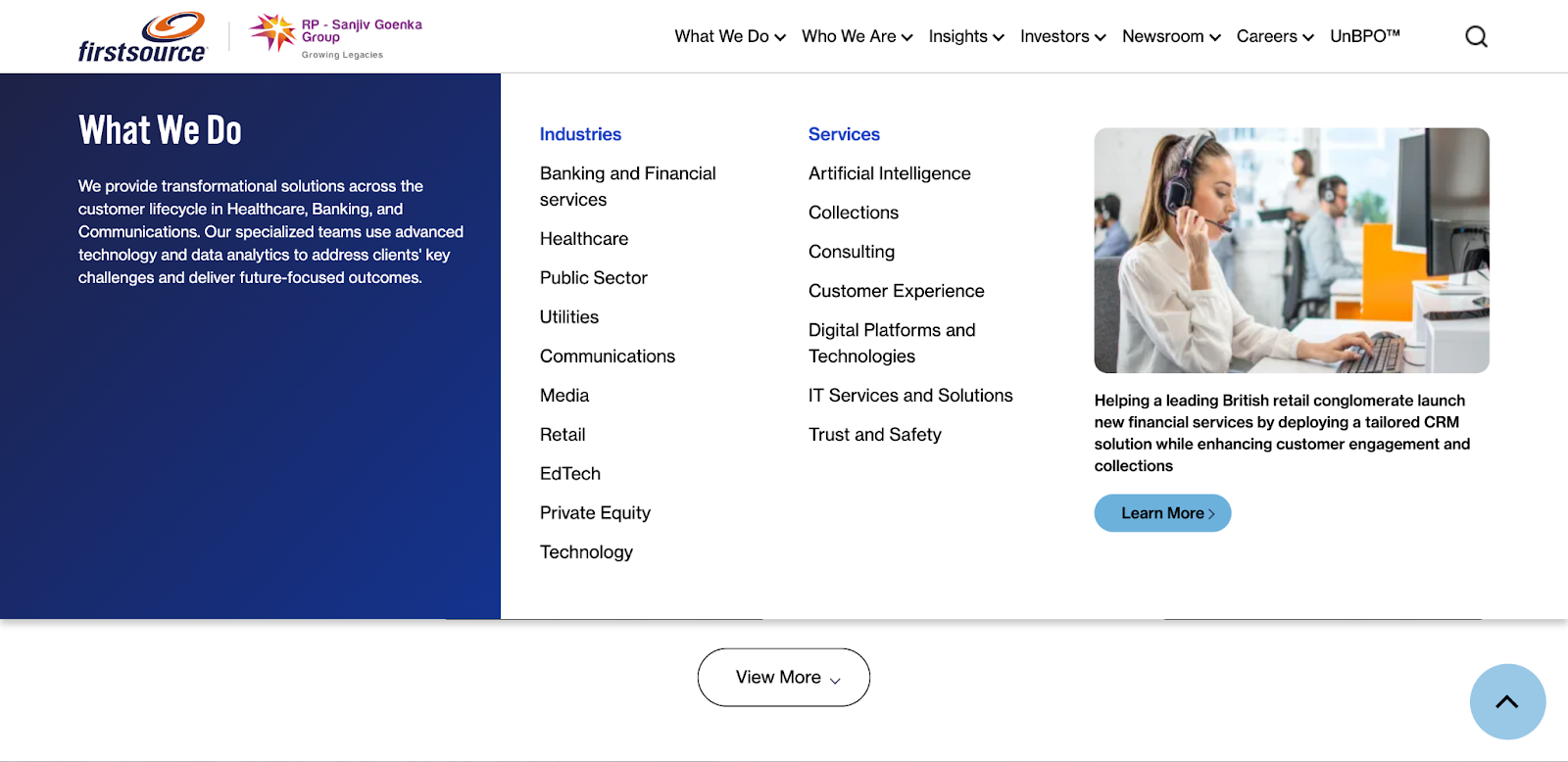
Image Source: firstsource.com
The most common BPO services include:
- Inbound and outbound calls via trained professionals.
- Customer Service
- IT Support and helpdesk
- Transcription services.
- Website design and SEO services.
- Processing medical bills and claims.
- Data entry services.
- Accounting
When setting up a BPO business, it is smart to focus on niche markets. At the same time, it is good to be flexible and open to local and global workforce demands.
2. Understanding the market
After selecting the niche for your outsourcing company, ask yourself if you have in-depth knowledge of the market. It’s important to keep yourself updated about the outsourcing market, its standards, and your target clients.
Identify markets or sectors that have a strong demand for the services you're offering. Learn about the problems your target clients face and how you can solve them by conducting surveys, analyzing competitors, reading industry studies, and speaking with prospective customers face-to-face.
Get industry-specific data with the help of platforms like LinkedIn, Google Trends, and Statista.
3. Write out a business plan
The key to success of your BPO business, like any other entity, is a good business plan. It is not only about figuring out your requirements - it holds greater value than that.
Lay the groundwork for your BPO organization, draft the ultimate plan, taking into account all necessary aspects and the budget associated with it.
Your business plan should include components such as:
- Description of your BPO company
- Overview of your execution process
- Competitive analysis: a study of your competitors and the industry
- Financial projections: Projected sales over specific periods of time.
- Marketing strategy and promotional activities you plan to implement.
- Funding (whether self, loans or VC funding).
- Expenses, including cost of equipment and employee salaries and benefits.
The business plan needs to be thorough and detailed, as it will also help you determine what you need financially.

Preparing a business plan shows you are serious about the endeavour, and it can help you secure capital through angel investors, government/bank loans or venture capitalists. It also helps you build strategic relationships.
4. Do the paperwork
When starting a business process outsourcing (BPO) company in India, you must ensure that all required documents are completed and submitted on time. There could be a bunch of problems with the legal foundation for starting a business if this is not done.
For setting up a business process outsourcing firm in India, you are required to register your business under the Companies Act 2013. Call center and other IT-enabled services should register as Private Limited Companies.
This requires minimum two directors and two shareholders; both can be same person if you want to start small. All directors and shareholders require:
- PAN.
- Aadhaar.
- Bank statement.
- Photo.
- Mobile and email ID.
- Address proof and NOC form.
You can read details on how to register your business here. Once the company is registered, its directors or promoters should open a bank account in the company name.
BPOs doing business via telecom resources must also obtain Other Service Provider (OSP) Licences from the Department of Telecommunication. Finally, GST registration is required once you have received the OSP Registration Certificate.
To recap, here are the steps:
- Get necessary paperwork from the Ministry of Corporate Affairs (MCA) to set up your outsourcing business as a Private Limited Company (Pvt Ltd) or LLP.
- Keep your PAN, TAN and GST numbers handy.
- Open a business bank account.
- Be familiar with the rules of the Foreign Exchange Management Act (FEMA) if you deal with international clients.
- To get IT-related services, register with the Software Technology Parks of India (STPI), if required.
- Get Shop and Establishment Act license, if required.
5. Invest in necessary equipment and set up your infrastructure
Get all the necessary equipment you need to ensure you never slow down in delivering high-quality services to your clients.
Those operating call centers will need to invest in good computers, reliable telephone lines and a high-speed internet connection. You will also need an office space, even if it is a small rented facility or your garage. Besides regular office supplies, you will also need to purchase:
- Good headsets.
- Call center software that integrates with your business tools.
- Call conferencing and monitoring software.
- A call recording system.
- An automatic caller information screen pop-up.
Whether your outsourcing company operates virtually or physically, your setup should include:
- Professional computers
- Secure internet access
- Data encryption and security applications
- Power backup like UPS and generators
- VoIP systems
- Customer Service (CRM) software
- Project management tools
- Office Space, if applicable.
Apart from the above equipment, invest in a business email system like GoDaddy's M365. It has the potential to improve communication, collaboration, and professionalism.
In recent times, the business process outsourcing industry has made use of emerging technologies such as cloud computing, social media and automation to reduce costs and accelerate growth. These are the ideal way to get greater ROI, but it is advisable to deploy technologies in a phased manner.
6.Ensure that your BPO business complies with legal and regulatory requirements
When handling confidential customer information or doing business on a global scale, legal compliance is of the utmost importance.
Important legal and regulatory procedures to undertake while starting a BPO in India are as follows:
- Any new venture launching across domains must be registered in accordance with the Companies Act, 2013.
- Join the National Association of Software and Services Companies (NASSCOM).
- Adhere to Indian labor laws, such as minimum wage, working hours, provident fund (PF), gratuity, and others.
- Adhere to data protection regulations set by international organizations, such as GDPR.
- Get ISO/IEC 27001 certification.
- Healthcare BPOs that deal with patient data from the US must comply with HIPAA.
7. Hiring and training your team

The key to success is its people. When you train your team and hire talented individuals, they will help you achieve your goals and build a name for your outsourcing business.
A few tips on hiring and training:
- Advertise in your local newspaper as well as on the internet on local job sites.
- Look for people who know how to talk and listen to customers while doing other tasks.
- Offer short coaching sessions for both full-time and part-time hires. For this you should allocate some funds.
- Set fixed hours or arrange your shifts to perform all the necessary services round-the-clock.
It is advisable to start small. Just imagine, if you have a 20-seater BPO and not a single client, how do you intend to pay salaries to them? You can start only with two to three people. Ensure that your clients come before the hires.
One option is to outsource the work to reliable part-time or work-from-home candidates.
Many women, especially those with children, prefer this kind of a setup.
Establish a reliable method for hiring people who are well-versed in all relevant areas, skilled problem solvers, and primarily focused on meeting client demands. You can consider university placements or online employment portals to hire real talent.
Employees in the BPO sector often do not work in regular shifts. So the training program should enable them to understand and adjust quickly to the changes in schedule and work environment.
While you are expected to hire people who have the right skills, customizing their skills to the needs of specific clients will win you valuable customers. It will also help you gain an edge over your competitors.
Finally, create an inviting and positive workplace environment. One of the biggest problems in the business process outsourcing (BPO) industry is employee turnover. To combat this, managers should provide growth opportunities, consistent feedback, and an overall friendly atmosphere.
5. Start by accepting short contracts
The day you decide to start your BPO company is the same day you should decide to start building a network. Attend conferences and events in your sector to connect with potential customers and get referrals.
Take advantage of the growing digital marketing landscape and use platforms like SEO and LinkedIn to engage with clients and build a robust client acquisition strategy.
Established BPOs have a reputation and a wide network that generates referrals. But for starters, it is best to let client companies try you out for a short time. This will in turn lead to bigger projects.
If you want to offer free trials, say for a few hours, that would be even better.
Some companies might be skeptical about using a new outsourcing company.
Your commitment and the quality of your service will help you win over some good long-term contracts and gradually become a known name in the BPO sector.
Can you accept short-term contracts?
Never hesitate to start small. Even if you find short-term contracts, say yes to them and treat them as practice contracts. Complete these first jobs to an outstanding standard and get client testimonials.
Being honest, communicating often and clearly, and having a strong commitment to data security will help you succeed, particularly when working with clients who are skeptical of trusting an outsourcing partner.
How to promote your outsourcing business?
Marketing is essential to creating demand for any BPO business. Nowadays, most consumers explore services online through websites and social media, so setting up a website is crucial. No matter how good your services are, no one will know about them unless you promote them online. Opt for all the low-cost strategies first, such as:
- Networking.
- Social media.
- Referral partners.
Depending on your budget, part of your digital marketing activity can be outsourced to an expert company.
If feasible, you should advertise on various outsourcing forums, besides having active pages on Facebook, Twitter, LinkedIn, YouTube and other social platforms. With the help of AI-powered tools, building a professional website is now an easy 30-minute task. To build an online presence, sign in with GoDaddy Airo and get started.
Also, as a reputable business you will need to create a professional website and of course a good domain name to go with it, one that represents your business.
Here are simple steps that even a non-technical person can easily follow to build a professional BPO website on their own:
1. Choose a perfect domain name
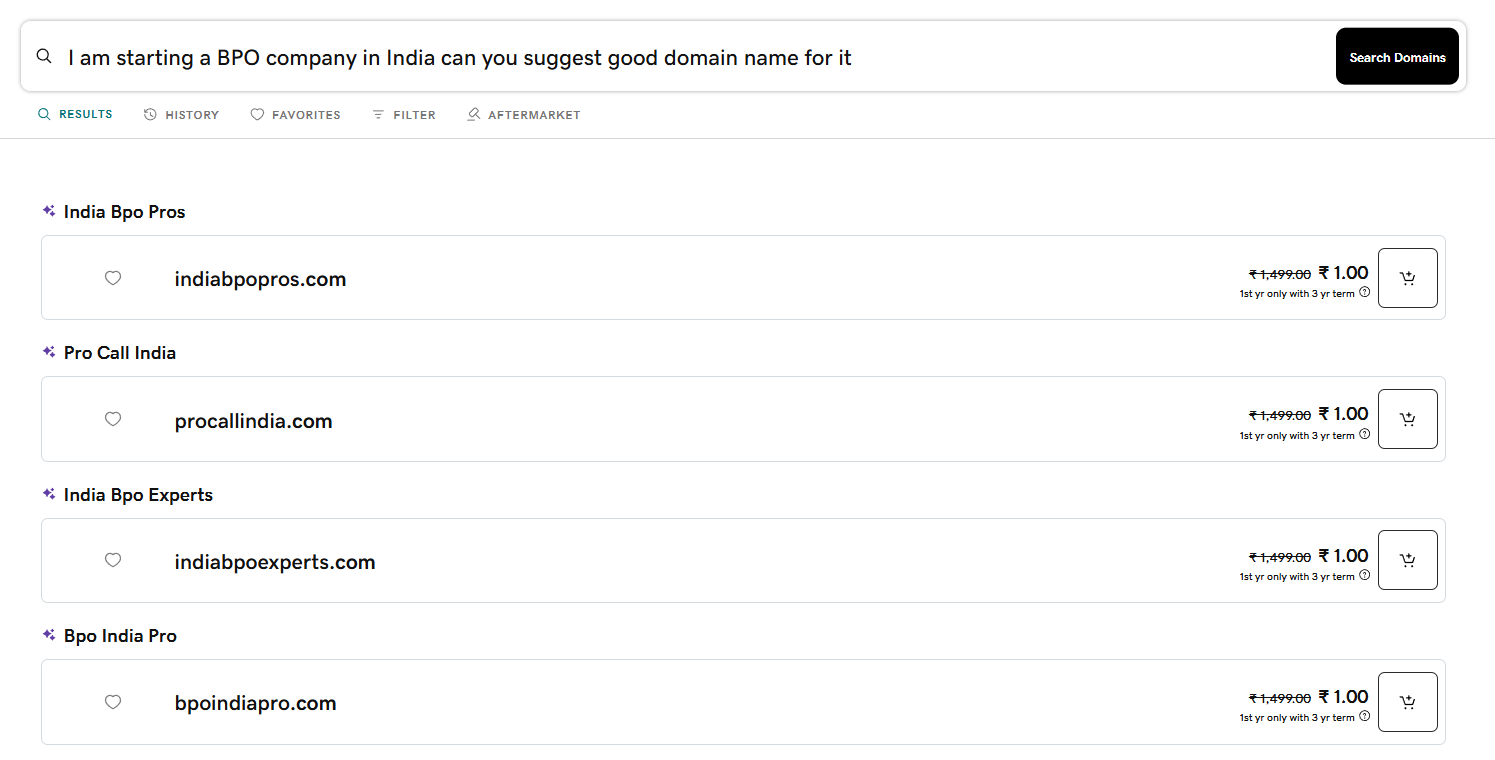
GoDaddy Airo will recommend brandable domain names like procallindia.com if you search for a suitable business term (for example, BPO firm in India).
Select one that is in line with your industry and brand goal.
Related: Definitive guide to using .in domain name extension for your business in India
2. Give your business a name
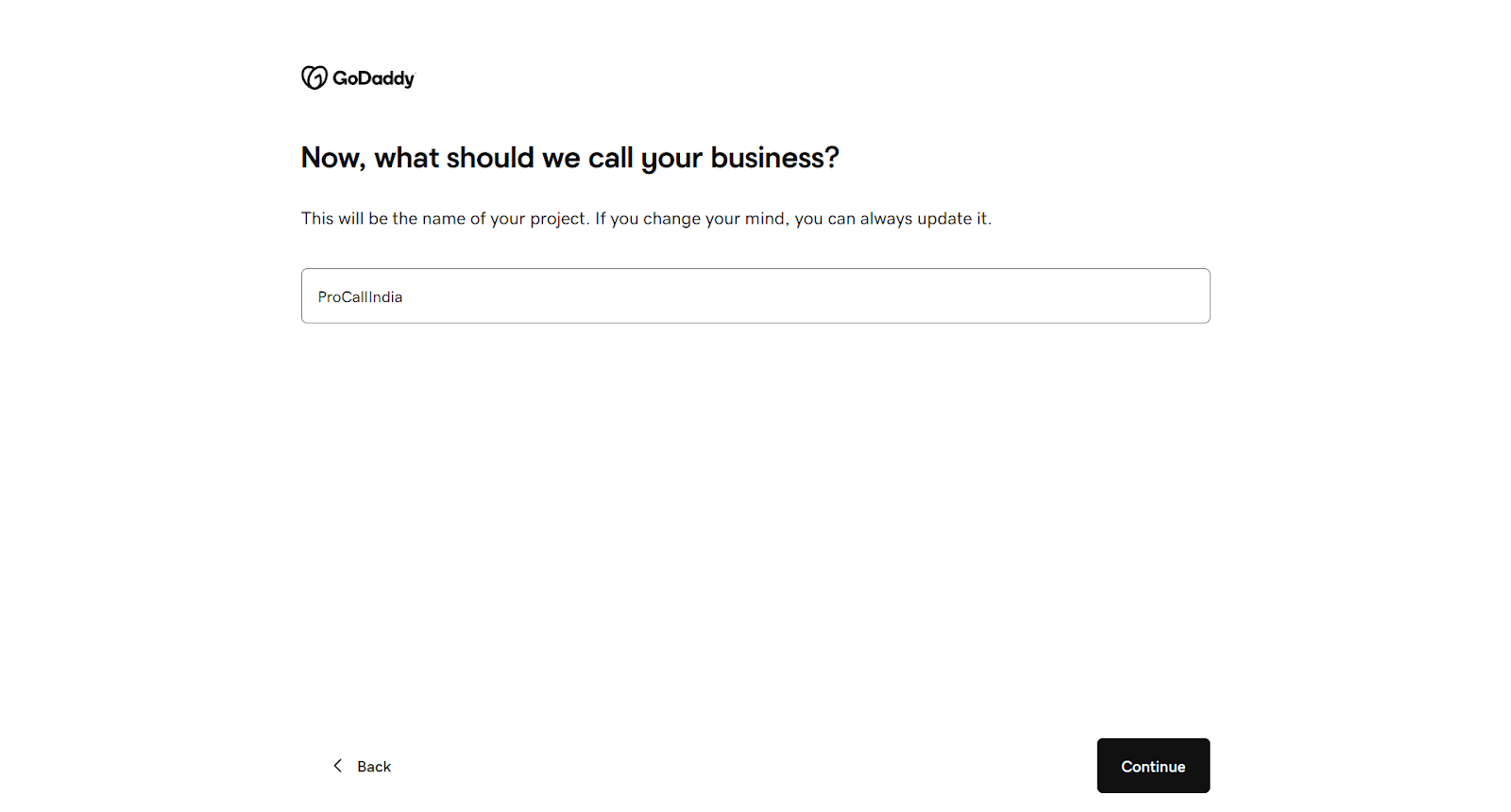
Enter the official name of your company that you want to use on your website. In this example, it's ProCallIndia. On your website, this becomes the brand header.
3. Add a business description
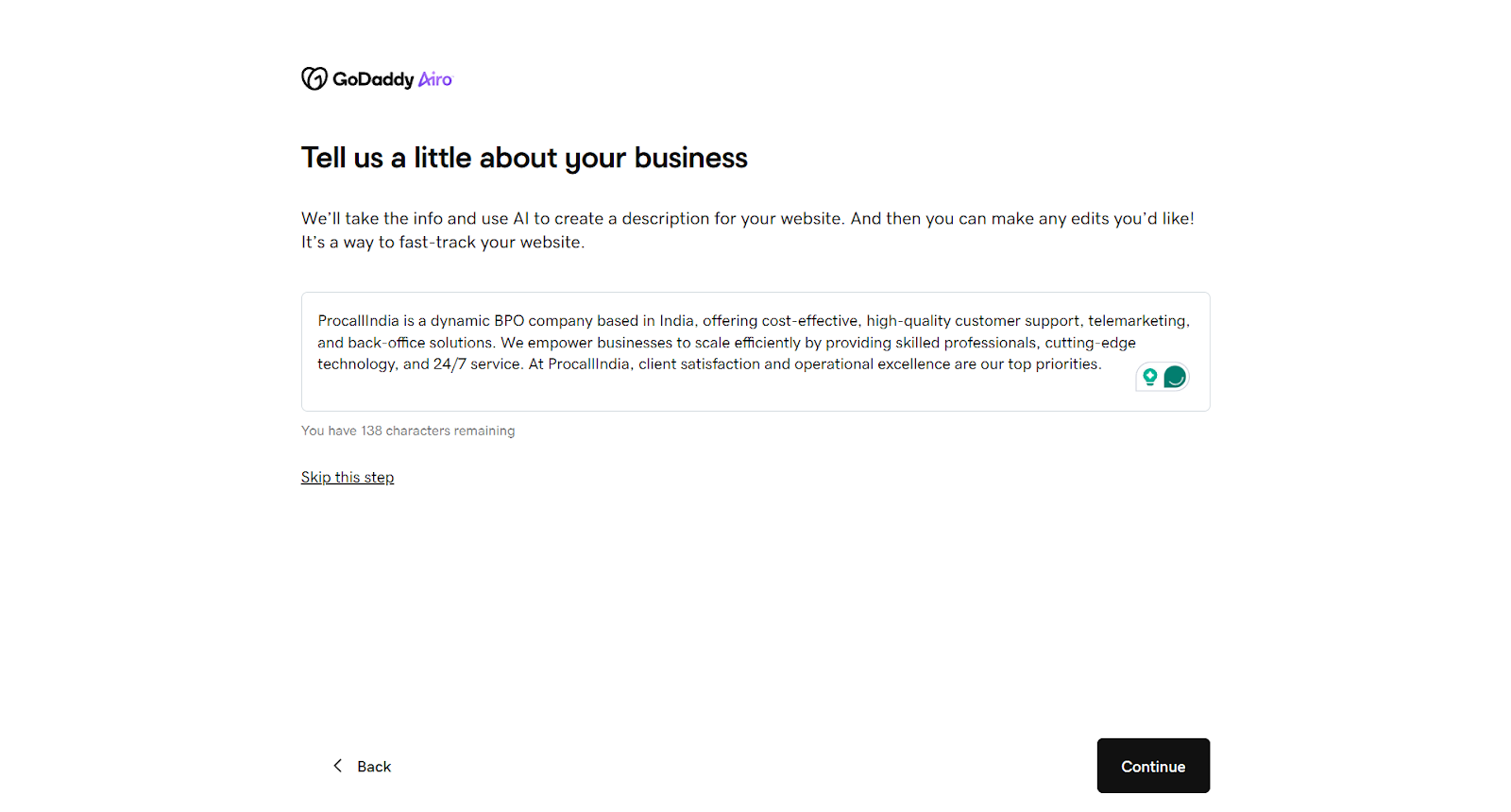
Describe your company's offerings in a short and puncy manner. Using this data, Airo creates customized content for the whole website. As an example, consider “ProCallIndia is a dynamic BPO company offering high-quality customer support, telemarketing, and back-office solutions.”
4. Let Airo help you suggest website content
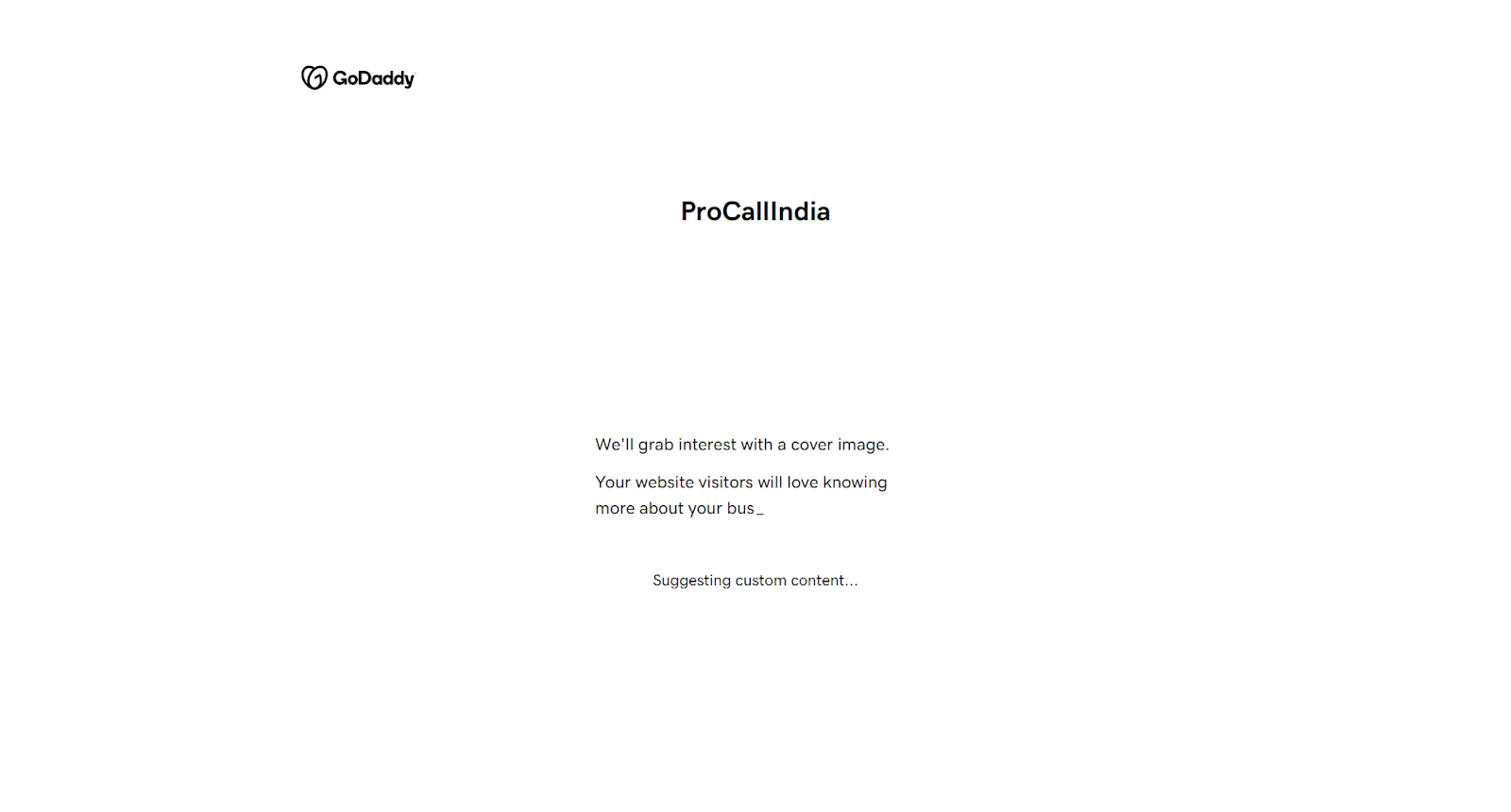
Using the data you provided, GoDaddy Airo will create an initial version of your homepage including your brand's graphics, messaging, and important calls to action. For an easier launch, let it fill content.
Choose a theme that matches your brand
Choose a visual theme, such as Organic, Craft, Focus, or Highlight. These dictate CTA styles, font combinations, and layout.
Customize fonts and colors
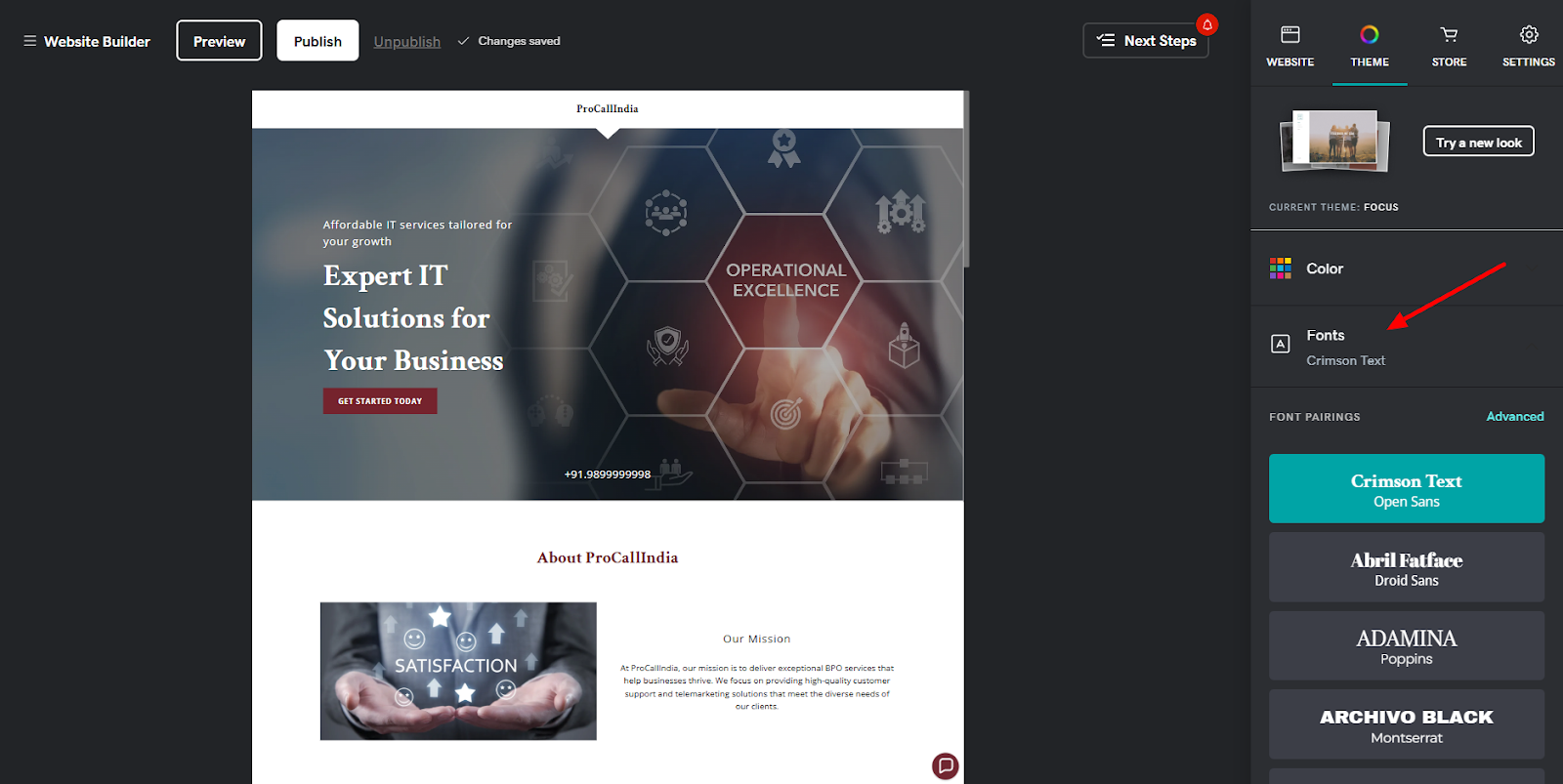
Select brand-matching font combinations (such as Crimson Text + Open Sans) in the Theme > Fonts section. Change the colors to match your branding standards or logo.
Edit buttons & navigation
To connect action buttons to relevant sections, change them (e.g., Contact Us, Get Started Today). Decide what will be shown on your homepage and top navigation.
Add a service page
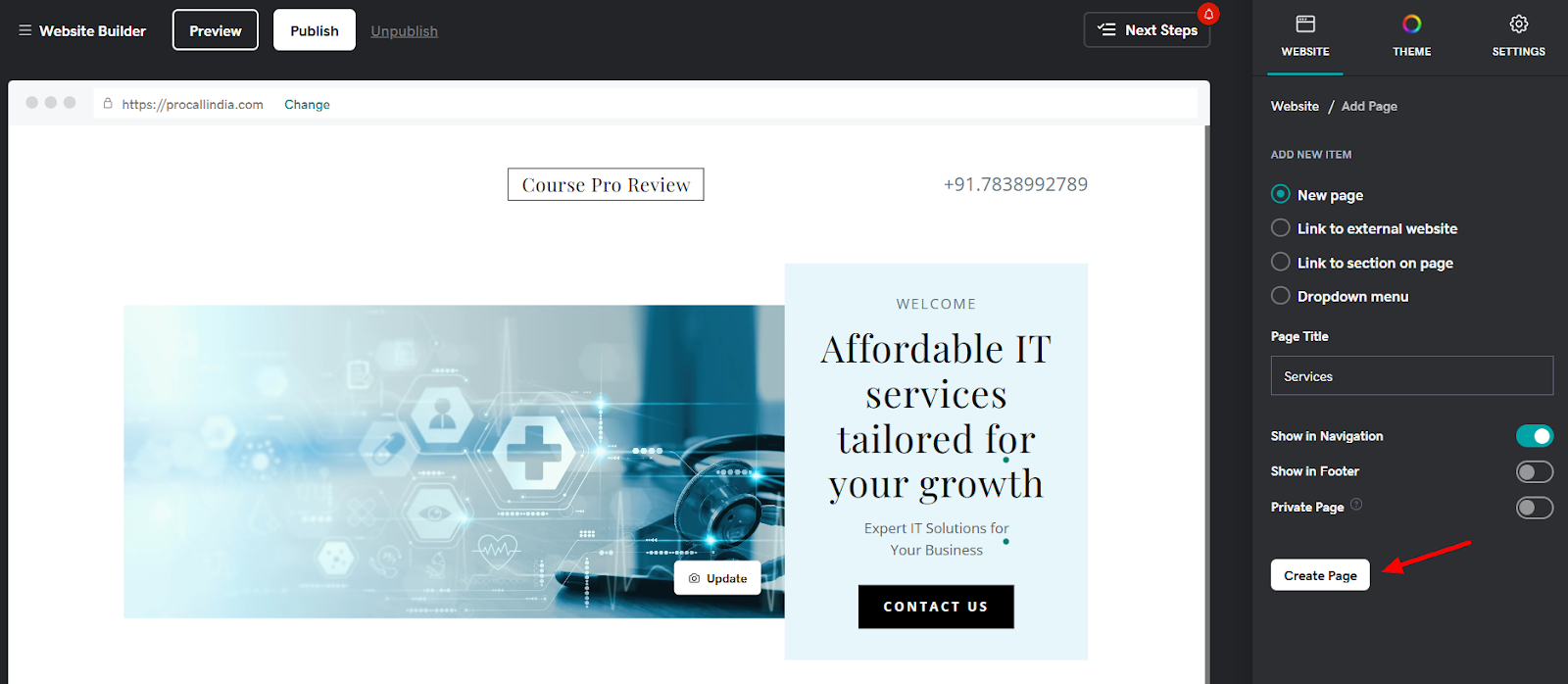
Choose New Page under Website > Add Page, then give it the name "Services." Change the navigation bar's visibility. This enables you to highlight services like back-office assistance, telemarketing, and BPO.
Tweak site settings
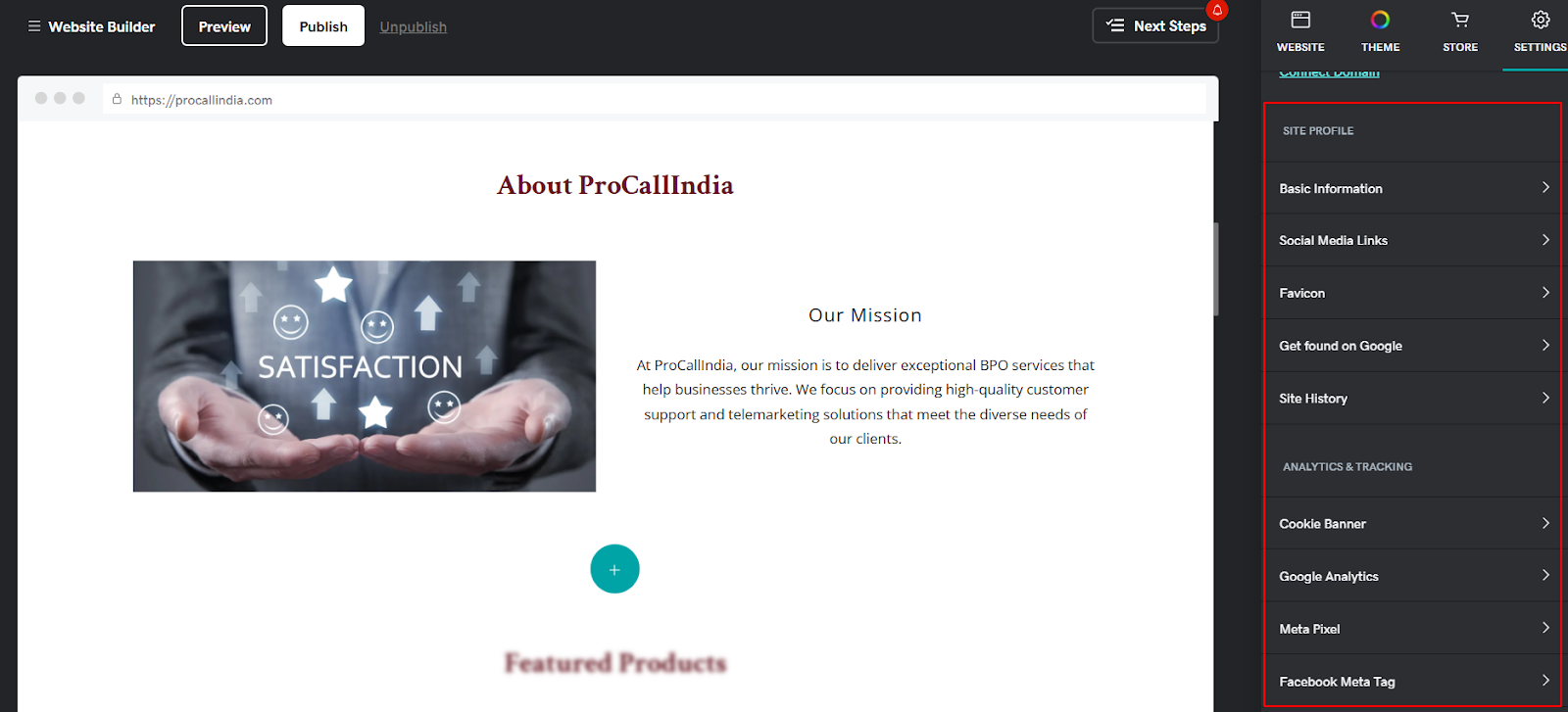
From the Settings tab, update:
- Basic info
- Social media links
- Favicon
- Google Analytics / Facebook Meta Tag for tracking
- Site history and SEO settings for discoverability
Final review and publish
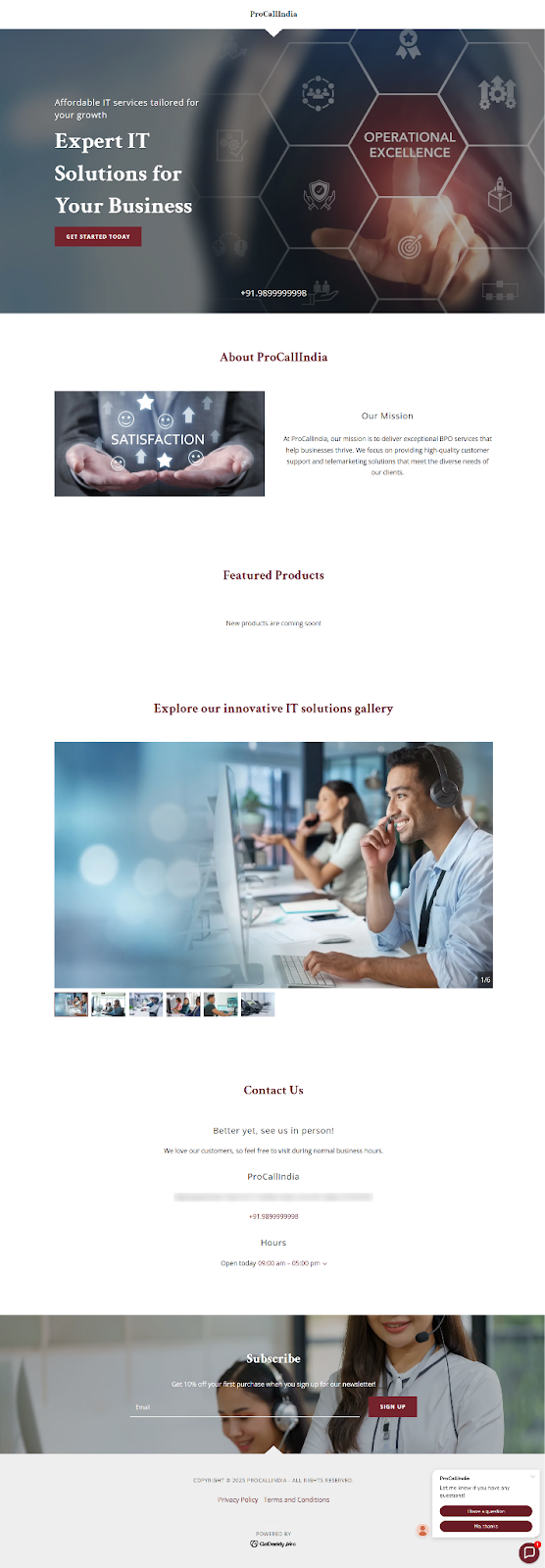
Check the responsiveness, speed, and content flow of your whole website by previewing it. If you're satisfied, click Publish, and your website will be online.
This ultimate DIY website builder helps entrepreneurs simplify their lives and get online fast.
A final word on business process outsourcing
The BPO sector is booming in India. It has also diversified beyond its beginnings. Indian BPOs now offer almost every service imaginable, including ITES outsourcing, with qualified staff able to work remotely in areas like coding and support.
Big corporations in the U.K. and the U.S. hire Indian BPOs because of their efficiency and low cost.
When done effectively, Business Process Outsourcing services guarantee you good profits and great success. If patience, problem solving, and adaptability are your virtues, this is indeed the right time for you to launch a BPO firm. Good luck!
Frequently Asked Questions on Business Process Outsourcing (BPO)
1. What is a BPO? Give some examples
Business Process Outsourcing (BPO) is when a company in any industry gives responsibility for internal business functions to third-party vendors (in other words, those outside their business).
BPO services are of great demand owing to benefits such as:
- Reduced costs
- Increased flexibility
- Enhanced service quality
BPO also allows organizations to remain focused on their core business activities so that they can deliver value to their customers.
The most common examples of this type of outsourcing are functions and departments like payroll, human resources, accounting, and call centers.
2. What are the different types of BPOs?
Based on its services and functionalities, BPO services are often divided into two main types:
Back office
Back-office services include internal business processes such as accounting and finance, human resource management, quality assurance, among others.
Front office
Front-office services include, looking after a client's customer-facing businesses, such as marketing, and sales, customer service and tech support, etc. Some BPOs combine these services so that they can function together.
The BPO industry can also be categorized into three types based on its location.
- Onshore – The Onshore BPO company operates its business in the same country as the client/contractor. However, they could be located in a different state or city. For example, a customer in Mumbai or Chennai, can outsource their jobs to a BPO firm in Delhi.
- Offshore – These BPOs are situated in a different country from customers/contractors. For example – A company in the United States or Australia could outsource their business processes to a BPO company in Indonesia or India.
- Nearshore – These BPO companies are located in close by or neighboring countries, like a customer in Germany outsourcing their work to a BPO company in Poland.
3. How did COVID-19 impact BPOs?
Before COVID-19, BPOs were a fast-developing sector providing a large number of jobs. COVID-19 and the ensuing lockdown took a toll on the Indian BPO industry.
The businesses which needed services from the BPO industry to support their retail operations suffered, as the entire retail market and distribution channel was totally shut.
Work-from-home for BPO companies was not an easy job. Companies, especially in banking, finance and those that require high data sensitivity client protocol disallowed transfer to work-from-home mode and thus, operations remained halted.
IT infrastructure became a key problem making work-from-home difficult. Disruptions caused by essential technologies or setup such as laptops/desktops, poor internet connectivity and other technical glitches, added to the woes.
As India reopens, the spending on business process outsourcing (BPO) industry in India is expected to grow at a compound annual growth rate (CAGR) of 5.8 per cent to reach $8.8 billion by 2025. This is due in part to a liberalisation of regulatory guidelines put in place to sidestep competition from countries like the Philippines, Malaysia, Mexico, and Canada.
4. What is the future of BPOs in the post-COVID 19 era?
The COVID-19 pandemic created major disruption to businesses worldwide and the BPO industry was no exception. But the changes brought to business functions due to these disruptions are providing impetus to the market in the long run.
Most BPO companies realized the need to change their business models. Many restructured their business continuity plans (BCP) to a distributed workforce, where their employees can work from remote locations.
The post COVID-19 BPO is stronger and more resilient. As more firms are increasingly focusing on reducing the cost of conducting business, BPOs of today should equip themselves with the right technologies such as cloud computing and artificial intelligence (AI) and more for driving business efficiency.
Tips on how to start a BPO business
Starting a business process outsourcing (BPO) firm in India requires careful preparation and ongoing improvement. For starters, here are some crucial tips to follow:
Managing projects efficiently
One of your primary responsibilities as a business owner is to ensure that your customers get first-rate service. In this regard, project management is essential. Take the following things into consideration:
- Use a project management application, like Smartsheet, Asana or Trello, to keep tabs on due dates and progress.
- To make it easier to communicate with customers and team members, use a technology like Slack or Skype.
- Always satisfy your clients' expectations by delivering services on time.
- To maintain a professional image and respond quickly to client and customer inquiries, use a professional business email.
A few possible barriers along the way include customer management, which can be addressed by creating scalable account management procedures to keep clients satisfied.
Quality control is also a concern, and to resolve it, you need to implement strong QA frameworks that can handle increased workloads without lowering standards.
Scaling your business
All the hard work goes into building the client base, and once you have a steady client base and better operations, the next goal is to scale your business.
When you've got your present setup under control and the funds permit, extend your service offerings by including more BPO services.
Also, your outsourcing company should upgrade to more sophisticated data analytics, AI, and automation systems in the future so it can manage higher volumes.
Start your BPO business in India with GoDaddy’s support!
India offers many attractive factors for business process outsourcing, including low operating costs, a large pool of qualified workers, and encouragement from the Indian government. However, to start a BPO business in India, the right execution is important, especially in the beginning.
With the help of GoDaddy Airo, startups can now start a successful outsourcing business and cash in on the growing BPO industry. It offers all the necessary digital resources, such as a professional company email, domain name, and Microsoft 365 subscriptions, all easy to set up.
Products Used
Editor's Note: This business process outsourcing post was first published on 18 March 2019 and updated 26 May 2022 and 15 August 2025. It also contains content written by Aman Jha.









